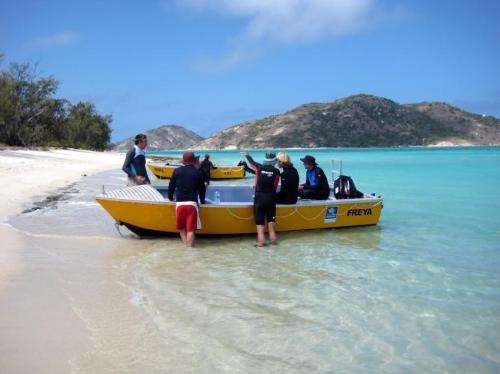Ocean acidification could lead to collapse of coral reefs

An expedition from the Hebrew University of Jerusalem and the Carnegie Institute of Science has measured a roughly 40% reduction in the rate of calcium carbonate deposited in Australia's Great Barrier Reef in the last 35 years—a scenario that could damage the reef framework and endanger the entire coral ecosystem.
Coral reefs are the most ecologically diverse and productive ecosystem in the ocean, with rich and diverse communities of fish, corals and mollusks making them a major attraction for marine and underwater tourism. Producing almost 50% of the net annual calcium carbonate in the oceans, corals play an important role in the global carbon cycle.
The ecological success of coral reefs depends on their calcium carbonate (CaCO3, limestone) structures that function as a huge filter to obtain plankton from the open ocean. Yet recent environmental changes including coastal nutrient pollution, global warming and ocean acidification caused by atmospheric CO2 increasingly threaten the existence of these unique ecosystems.
To better understand the effect of acidification on coral growth decline, Hebrew University scientists led by Prof. Jonathan Erez and Prof. Boaz Lazar at the Fredy and Nadine Herrmann Institute of Earth Sciences, together with Carnegie Institute colleagues Dr. J. Silverman and Dr. K. Caldeira, carried out a community metabolism study in Lizard Island at the Great Barrier Reef in Australia.
The researchers compared calcification rates documented in 2008 and 2009 to those measured using similar techniques in 1975-6. Despite the fact that the coral cover remained similar, the researchers found that the recent calcification rates had decreased by between 27% and 49%. These lower rates are consistent with predictions that took into account the increase in CO2 between the two periods, suggesting that ocean acidification is the main cause for the lower calcification rate at Lizard Island.
While previous studies on individual reef building corals have shown that they lower their calcification rates in response to ocean acidification, in the present study this was demonstrated for the whole community. These findings suggest that coral reefs are now making skeletons that are less dense and more fragile. While they still look the same, these coral reefs are less able to resist physical and biological erosion.
According to Erez and Silverman, "The results of this study show a dramatic decrease in the calcification of the reef, and that it was likely caused by ocean acidification. When the rate of calcification becomes lower than the rate of dissolution and erosion, the entire coral ecosystem could collapse and eventually be reduced to piles of rubble. The collapse of this habitat would ultimately lead to the loss of its magnificent and highly diverse flora and fauna."
Erez and Silverman added, "Routine measurements of net community calcification should be continued not only at Lizard Island but at other reefs around the world in order to monitor their well-being in a high CO2 world."
The research was published in Geochimica et Cosmochimica Acta, a journal of the Geochemical Society and the Meteoritical Society, as "Community calcification in Lizard Island, Great Barrier Reef: A 33 year perspective." The research was supported by the Israel Science Foundation and the Moore foundation.
Journal information: Geochimica et Cosmochimica Acta
Provided by Hebrew University of Jerusalem
















